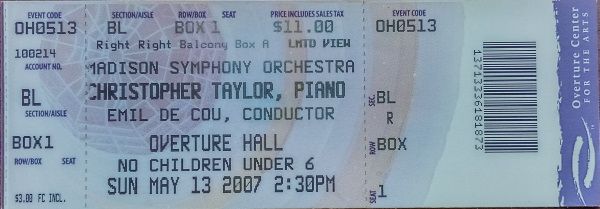14 May, 2007
Cantiones Profanae
On Sunday it was off to the symphony with The Dulcinea and her sons for a little high culture. The highlight of the program was Carl Orff's Carmina Burana. The last time I saw this piece performed, I fell in love with one of the violinists. My lust was restrained this time around due in no small measure to the nosebleed box we found ourselves in. But the tickets were only $11 so one cannot complain.
The afternoon's performance began with Prokofiev's March and Scherzo from Suite from "The Love for Three Oranges," Op. 33 bis. I was familiar with his "barbaric" Scythian Suite, "Troika", and, of course, his ballet Romeo and Juliet and so it came as a wonderful surprise that I recognized this piece. It was a great little ditty (it clocked in a 4') and, come on! Who doesn't love a scherzo? This was followed by Gershwin's Concerto in F. Written in 1925 and originally entitled New York Concerto, I was thoroughly unsurprised to hear strains of jazz in the work. Their presence didn't mark this piece as being less than serious or any such thing for me but those passages seemed to sit uncomfortably in an orchestral setting. The final very agitated (Molto agitato) movement was great with its dramatic rushes and extreme dynamics. During the intermission, I felt no great need to bask in the glory of Gershwin but resolved to check out some more Prokofiev.
Ah, spring! The weather warms, everything gets all verdant. Birds are doing it, bees are doing it, and I'm doing it. And I always bust out Stravinsky's The Rite of Spring and Carmina Burana. (I am still kicking myself for having missed the MSO's performance of the former back in March.) In anticipation of the performance, I asked The Dulcinea's oldest, D., if he was familiar with it. He wasn't. I asked him if he'd seen The Omen and he hadn't. I realized that I obviously had much work to do. He's 12 years old and is the perfect age to be molded into a dork by his mom's boyfriend. No remake for him! We're going straight to the 1977 original with Gregory Peck starring, Patrick Troughton being impaled, and Orff on the soundtrack.
The history of the piece, in brief: Orff was introduced to a collection of 13th century poems that were discovered in 1803. He chose a couple dozen of the poems and wrote his piece around them. Written mostly in Latin (as well as Middle High German and Old French), the poems selected by Orff concern Fate, spring, the vulgar activities of tavern life, and courtly love.
Any performance of Carmina Burana is of a big scale. The MSO was joined by the Madison Symphony Chorus, the Madison Youth Chorus, and soprano Tonna Miller, tenor Joel Burcham, and baritone Donnie Ray Albert. You've got everything but the kitchen sink here and, when they got going, it was nice'n'loud.
"O fortuna" opened the proceedings with a blast. There's nothing quite like a whole chorus bellowing at you in your favorite dead language that Fate is monstrous and empty. As good as that was, I really wanted to hear all the naughty bits about the springtime. This section opens with a scurrying flute in "Veris leta facies" but really gets moving two sections later in "Ecce gratum". The third verse is my favorite with those hesitant first steps of "Gloriantur/et letantur/in melle dulcedinis". Fucking magic.
"Tanz (Dance)" is next. This is one of the most joyous pieces of music ever written. You've got the opening fanfare and then a roll on the snare which comes to a close with the tympani. There's also that part at the end with the brass playing the melody and the strings imitating the flight of birds and it just becomes the ultimate fanfare for ushering in the spring. So hopeful, so joyous - it sends a rush down my spine and brings tears of joy to my eyes. I found it odd having to wait for the succeeding bit, "Floret silva nobilis" because I am so used to hearing it on CD where there is virtually no gap at all. (I have the recording of the San Francisco Symphony on London.) Soon enough we're in the tavern with Mr. Albert doing his best drunken abbot imitation. What is the notation for slurring one's singing as if intoxicated?
The third section is where all the really naughty stuff happens. Thankfully neither D. or M. bothered to look at the program to find out that "Mea mecum ludit virginitas" means "My virginity makes me frisky". And I'm sure The Dulcinea would be loathe to have to explain this:
If a boy with a girl
tarries in a little room,
happy is their coupling.
Love rises up,
and between them
prudery is driven away,
an ineffable game begins
in their limbs, arms and lips.
Love rises up indeed.
Labels:
Classical music,
Music
Subscribe to:
Post Comments (Atom)

No comments:
Post a Comment